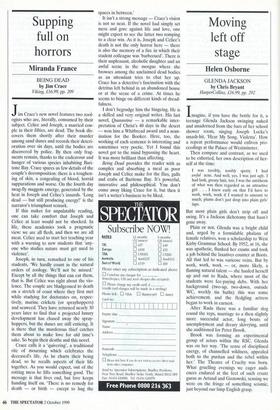Supping full on horrors
Miranda France
BEING DEAD by Jim Crace Viking, £16.99, pp. 209
Jim Crace's new novel features two zool- ogists who are, literally, consumed by their subject. Celice and Joseph, a married cou- ple in their fifties, are dead. The book dis- covers them shortly after their murder among sand dunes and records their deteri- oration over six days, until the bodies are discovered by police. By then only frag- ments remain, thanks to the endeavour and hunger of various species inhabiting Bari- tone Bay. Crace spares us few details of the couple's decomposition: there is a toughen- ing of skin, a congealing of blood, horrid suppurations and worse. On the fourth day swag-fly maggots emerge, generated by the heat in Joseph and Celice's innards. 'Long dead — but still producing energy!' is the narrator's triumphant remark.
If this makes for unpalatable reading, one can take comfort that Joseph and Celice at least would not be shocked. In life, these academics took a pragmatic view: we are all flesh, and then we are all meat. Celice used to start her teaching year with a warning to new students that 'any- one who studies nature must get used to violence'.
Joseph, in turn, remarked to one of his students, 'We hardly count in the natural orders of zoology. We'll not be missed.' Except by all the things that can eat them, that is. But Celice was right about the vio- lence. The couple are bludgeoned to death on a stretch of coast where they first met while studying for doctorates on, respec- tively, marine crickets (or sprayhoppers) and seaweed. They have returned nearly 30 years later to find that a projected luxury development has chased away the spray- hoppers, but the dunes are still enticing. It is there that the murderous thief catches them about to make love for old time's sake. So begin their deaths and this novel.
Crace calls it a 'quivering', a traditional rite of mourning which celebrates the deceased's life. As he charts their being dead, so he recalls aspects of their life together. As you would expect, out of the rotting mess he lifts something good. The message is that lives end, but love keeps handing itself on. 'There is no remedy for death — or birth — except to hug the spaces in between.'
It isn't a strong message — Crace's vision is not so neat. If the novel had simply set mess and gore against life and love, one might expect to see the latter two romping to a clear win. As it is, Joseph and Celice's death is not the only horror here — there is also the memory of a fire in which their student colleague was `barbecued'. There is their unpleasant, alcoholic daughter and an awful scene in the morgue where she browses among the unclaimed dead bodies as an attendant tries to chat her up. Crace has a detective's fascination with the detritus left behind in an abandoned house or at the scene of a crime. At times he seems to binge on different kinds of dread- fulness.
I don't begrudge him the bingeing. He is a skilled and very original writer. His last novel, Quarantine — a remarkable inter- pretation of Christ's 40 days in the desert — won him a Whitbread award and a nom- ination for the Booker. Here, too, the working of each sentence is interesting and sometimes very poetic. Yet I found this novel got to the mind bypassing the heart. It was more brilliant than affecting.
Being Dead provides the reader with as complex and absorbing a meal as poor Joseph and Celice make for the flies, gulls and crabs of Baritone Bay. It's powerful, innovative and philosophical. You don't come away liking Crace for it, but then it isn't a writer's business to be liked.










































































 Previous page
Previous page